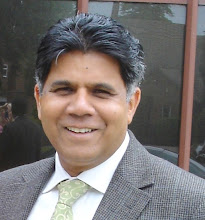Modern organizations are confronting unprecedented situations in the world today, and the future is going to be even more challenging. The current financial meltdown is just a sign of things to come. We confront rapid and exponential change. The pace of change itself is exploding. We have rapidly changing environments, situations, products and markets. And our old model of organization is not going to cut it. It is too slow and cumbersome.
To deal with the rapid rate of change we are going to have to be organizationally quick on our feet, or we will lose opportunities to competitors who are more nimble and quick acting than we are. We need to release the creativity of our people and allow decisions to be taken on the spot. We are going to need to train, empower and enable people to think and act independently and decisively in a way that fulfils what the organisation is committed to.
Ironically, one of the biggest complaints that people have in their working lives is that they do not find self expression, satisfaction and fulfilment at work, especially if they work in large organizations. People feel that their creativity is suppressed and that they cannot fully contribute what they would like to. Organizations are hierarchical, and structured so that individuals cannot change them. People have to give up their autonomy, creativity and self-expression to fit in, succeed or simply survive in an organisation.
The Past
If we go back to the origins of how and why human beings first started to organise themselves we begin to see why organisations are the way they are.
When human beings first started to organise themselves, they did so to deal with situations or circumstances that they were not able to deal with individually. For example, they banded together to defend themselves against predators or marauders. In order to work together for their survival, the individuals had to give up some of their personal power and freedom. These early social groupings could be seen as the first organisations.
As the groupings became bigger and more complicated, strong leaders emerged to control them. Rules and codes of behaviour were developed, and punishments were established as a method of making people stick to the rules. As leaders became more powerful, war lords or overlords demanded that people serve them in exchange for their protection. People were turned into serfs. They were a functioning part of the group, but they had no say, no choice.
Then came the industrial revolution and there was a renewed need for organisation. This time the industrial barons demanded of their employees the same unthinking obedience that the landowners had demanded of their serfs. As a reaction to this there arose the labour movement. However, these new labour organisations were also suppressive of individual freedom. Everyone had to tow the party line.
The fundamental thing about organizations is that they are hierarchical; it is a matter of command and control…but there are huge limitations to this model. People in this model are fundamentally not responsible for the work that they do, and are using only a fraction of their power. This is of little benefit to either them or the organisation they work for.
The Future
What will resolve this conundrum is a new model of organization. In fact from where I stand I see a new future for ‘Organisation' evolving. Hence the title: 'Evolution of Organisation'
What might this evolution involve? Are there any emerging models already?
First let us consider the Internet and what that makes possible:
The Internet is a group of people linked together without any hierarchy (like the knights in King Arthur’s Round Table). Each computer is as important as the other. Each is equally available to everybody. The Internet makes it possible for people to connect and work together across locations, organisations, skill sets, experience etc. It is now feasible to have employees work from home and still be a contributing and significant part of an organization.
Secondly when we consider political groupings like the European Union we see movement towards consensus (rather than confrontation, domination or the majority running the show). The European Union has made it possible for less powerful countries to have a say, as well as countries like the UK, France and Germany.
The process of generating consensus in coalition governments is another model that is pointing the way.
All this is creating the possibility of a new type of organisation never before experienced.
So we come to some critical questions:
What will the organisation of the future be like?
What will it look like and what will be possible?
What are the skills that will be needed to effectively run this new kind of organisation?
In our next post we will address this further, and we welcome your participation in this ongoing inquiry.
